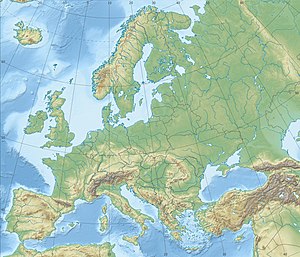| Battle of Nicopolis | |||||||||
|---|---|---|---|---|---|---|---|---|---|
| Part of the Ottoman wars in Europe and the Crusades | |||||||||
 Miniature by Jean Colombe (c. 1475) | |||||||||
| |||||||||
| Belligerents | |||||||||
| Crusade: | |||||||||
| Commanders and leaders | |||||||||
| Stefan Lazarević |
| ||||||||
| Strength | |||||||||
| 10,000–20,000[8][9][10] | 17,000–20,000[8][10][11] | ||||||||
| Casualties and losses | |||||||||
| Considerable Ottoman losses[12] | |||||||||
Location within Europe | |||||||||
The Battle of Nicopolis took place on 25 September 1396 and resulted in the rout of an allied Crusader army (assisted by the Venetian navy) at the hands of an Ottoman force, raising the siege of the Danubian fortress of Nicopolis and leading to the end of the Second Bulgarian Empire. It is often referred to as the Crusade of Nicopolis as it was one of the last big Crusades of the Middle Ages, together with the Crusade of Varna in 1443–1444. By their victory at Nicopolis, the Turks discouraged the formation of European coalitions against them. They maintained their pressure on Constantinople, tightened their control over the Balkans, and became a greater threat to Central Europe.[15]
- ^ Alexandru Madgearu, The Wars of the Balkan Peninsula: Their Medieval Origins, ed. Martin Gordon, (Scarecrow Press, 2008), 90.
- ^ a b c d e Cite error: The named reference
Tuchman548was invoked but never defined (see the help page). - ^ The Crusades and the military orders: expanding the frontiers of latin christianity; Zsolt Hunyadi page 226
- ^ Valerii︠a︡ Fol, Bulgaria: History Retold in Brief, (Riga, 1999), 103.
- ^ Nicolle, David (2000). Constantinople 1453: The End of Byzantium. Osprey Publishing. p. 19. ISBN 978-1-84176-091-9.
Ali Pasha Candarli, who served Bayazit I so well (see Campaign 64, Nicopolis 1396).
[permanent dead link] - ^ (Djokić 2023, p. 128)
Not all Serb magnates fought and died as Ottoman vassals. Vuk Branković, who survived the Kosovo battle, and who continued to rule over his realm that included Kosovo, joined a large Christian coalition led by Hungary, which now represented the 'bulwark of Christianity' and included Wallachian, Venetian, Bulgarian, Croatian, French and English troops. The Christian coalition was defeated by Ottomans at Nicopolis, Bulgaria in 1396. Branković died as an Ottoman prisoner the following year, but is ironically portrayed in the Serbian folklore as a Judas-like figure.
- ^ (Cerović 2002, p. 228)
Вук Бранковић, син Бранков, оженио се Маром, кћерком кнеза Лазара. Његови поседи протезали су се од Скопља до Копаоника и Сјенице, до горњих токова Таре и Мораче. После битке на Косову, примио је вазални однос према Турској. У бици код Никопоља учествовао је на страни Угарске, када га је заробио султан Бајазит и одвео га у заробљеништво, где је умро, 1397. године.
- ^ a b Nicolle, p. 37. "In fact the Crusaders probably numbered some 17,000 men. Traditional Turkish sources give the number of Ottoman troops as 10,000 but when their Balkans vassals were included they may have numbered around 15,000."
- ^ Cite error: The named reference
Tuchman554was invoked but never defined (see the help page). - ^ a b Cite error: The named reference
Grantwas invoked but never defined (see the help page). - ^ Rogers, Clifford (2010). The Oxford Encyclopedia of Medieval Warfare and Military Technology.
- ^ a b "Battle of Nicopolis". Encyclopædia Britannica. 2009. Retrieved 2009-02-18.
- ^ Tuchman 562
- ^ Grant, p 122
- ^ "Battle of Nicopolis". Encyclopædia Britannica. 2009. Retrieved 2023-06-20.
